... starting with the conclusion of Erica's/Ahadi's tale.
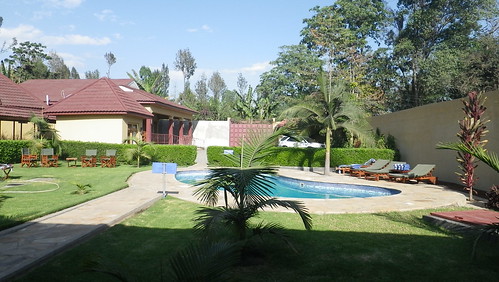

So, Erica is extremely friendly and chatty. I take it a lot of that comes from the fact that she is reasonably bored most of the time. Sure she has a business to run, but the lodge isn't huge, and it seems she has a naturally loquacious disposition which cannot be satisfied by the periodic visit of Westerners who, of course, come to the lodge when they are (a) tired or (b) want some downtime from constant sightseeing and being around people. And not all of them speak English.
Which is why on the last day before our flight, while Resha and I were determined to make the most of our last day by exploring downtown Arusha, Erica cornered William when he innocently went to ask about our room invoice and stamps, and told him her entire story. A bunch of it I have relayed in the previous post, but the most interesting parts concerned her views on the people of Tanzania, particularly her staff.
To put it simply, she has found it difficult to run a business in Tanzania. We all know of (or have been involved with) horror stories involving contractors in Western countries. Well, Tanzania is no different, and indeed measurably worse. The red tape here is the largest problem, as there is quite a bit of civil service corruption. We ran into a little bit of it on safari when we were pulled over by random policeman on the side of the road. I had noticed a ridiculous number of licenses and certifications on upper right side of the back window of our vehicle.
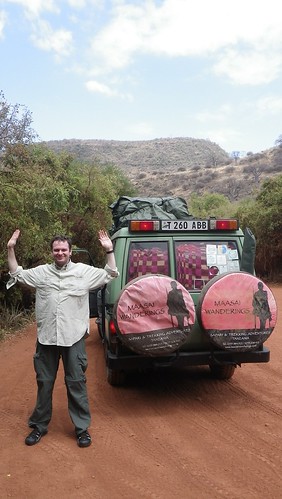
Well, David immediately began "politely" arguing with the policeman in Swahili. He then got out of the vehicle and walked to the back of the vehicle, and then they both began pointing at different decals, still "politely" arguing back and forth. Seeing as how we didn't want David to get in trouble and/or to be hauled off to a Tanzanian jail, I figured some money (on the order of dollar bills) would change hands, we would gladly reimburse him, and that would be that. To our mild surprise, however, David eventually just walked back to the front of the vehicle, got back in, and drove away. When we asked what happened, he said that it indeed was a shakedown over "papers," but that the country was actually making progress on corruption to the point that he knew this particular policeman was just bluffing.
So anyways, Erica was able to navigate the bureaucracy and shady construction companies to get the lodge built, but then she had to staff it, and the adage "good help is hard to find" apparently applies even more so in Tanzania. Everyone knows "hakuna matata," which roughly translates to "no worries." Now, that's a great life philosophy in theory, but like hippie culture, when it gets applied wholesale to an economic structure, problems apparently arise. Erica said that because of this "hakuna matata" mentality, many Tanzanians have an attitude that "life will just work itself out" and "everything happens for a reason." Because of this, she says the general populace has, laziness isn't the proper word, but more of an indifference to things, including employment.
To that end, she has had problems with her staff, not really for disobedience, but because they really aren't taking the extra logical step you would expect in a Western service environment. It creates an interesting dichotomy. For example, we had our laundry done both at the end our safari and Kilimanjaro. It was collected and completed within 12 hours. No complaints on our end. Behind the scenes, however, she has had to repeatedly tell her staff to not open a new box of detergent each day, even if it is the easiest one to reach.
While we were lounging by the pool, and at dinner, a hostess was very attentive to us, bringing us drinks and snacks. Behind the scenes, however, Erica said that it took months to realize that the staff was not taking inventory of what was available behind the bar, and that it took a customer commenting on the fact that they seemed to be out of most of their beer before she realized that no one had told her they were running out, costing her who knows how many sales.
The same goes for food. Apparently Ahadi is known in Arusha for having good steaks. Indeed, her daughter and grandchildren come by frequently for dinner because the food is so good, a fact that we also can attest to. In fact, there is a gentlemen who comes by several times a week just for the steak. One evening, however, he came by only to be told that all the steaks were frozen. He said he would gladly wait for it to thaw, but was told that by the cook that he (the cook) didn't really feel like going through all that effort, so the gentleman left. Now, that's bad enough, but when Erica looked in the fridge later that evening, she saw that there were actually four thawed steaks just sitting there. The cook hadn't bothered to open the fridge just a few feet away to check.
She sees the same attitude, for better or for worse, permeating her family as well. One day, she walked into her office to find one of her granddaughters ripping open reams of papers and coloring over them. Now, this is of course cute on some level, and she didn't really mind that much, but she did mention to her daughter that it had happened and if she couldn't speak to her kids about not destroying things that weren't theirs. After all, she was trying to run a business. However, her daughter just shrugged and said something along the lines of "eh, kids, what can you do," and left it at that.
Okay, enough philosophizing.
I really don't have any additional animal pictures that aren't duplicative, so I'll just devote this week to "miscellaneous."
At this point, we had been in Tanzania a few days and finally gotten over jet-lag to the point where we were more-or-less out of the "brain-haze" and back to our normal selves. Hence, we started having more fun with our photography. Or maybe we were just getting bored of animals.
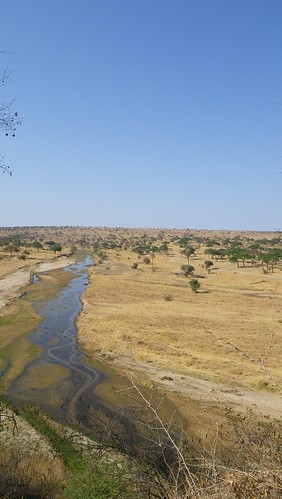
This is the "mighty" Tarangire. I show you this to give you an idea of the canvas which the following masterpieces were placed upon.
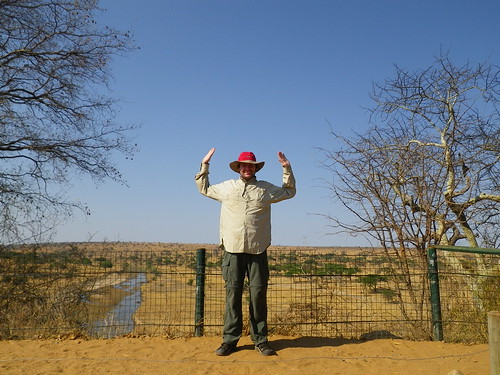
You all know William "Beavis."
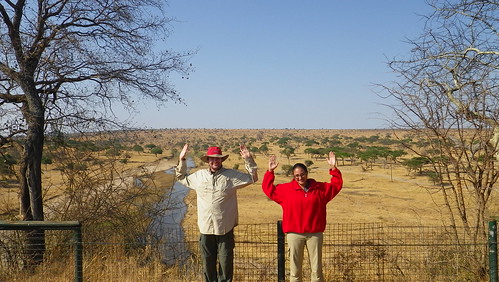
Well, this is Resha finally succumbing to the Beavis virus.
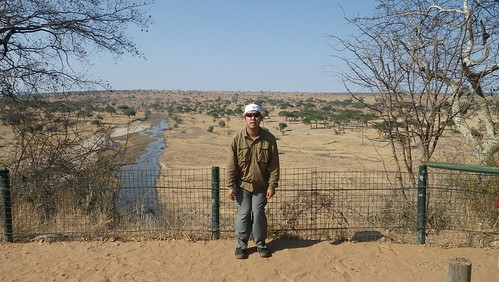
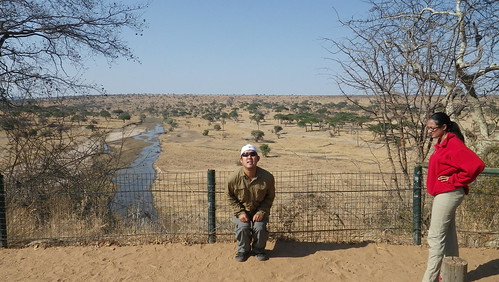
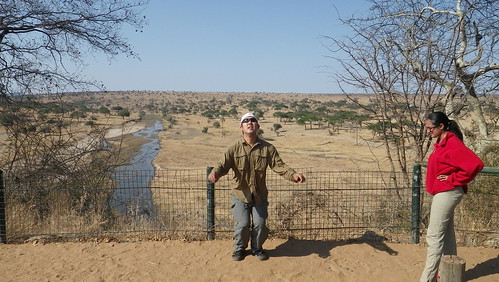
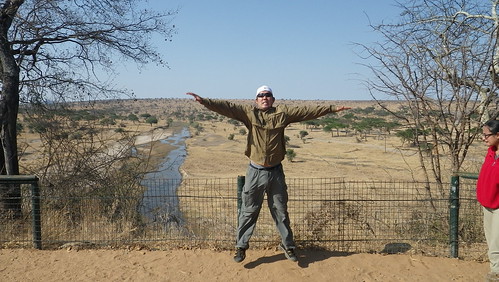
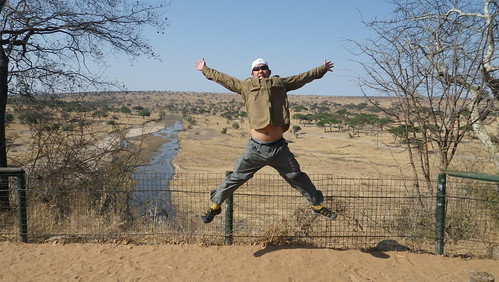
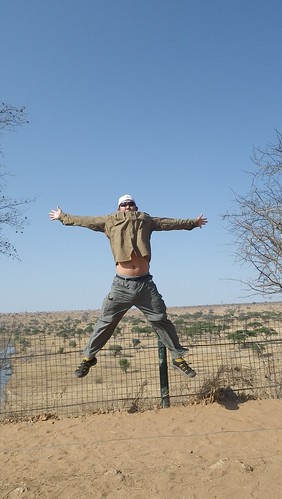
This looks like the work of a time-lapse shutter, but we did it the old-fashioned way - completely by accident. We were trying to time it to get the last picture (sans belly), but it just worked out that you ended up with the former pictures when we mistimed it (a lot).
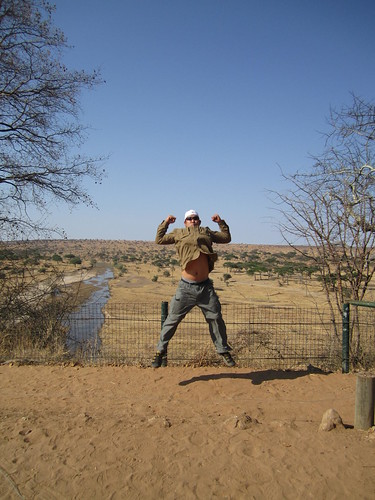
This "strong" pose confirms what I said previously.
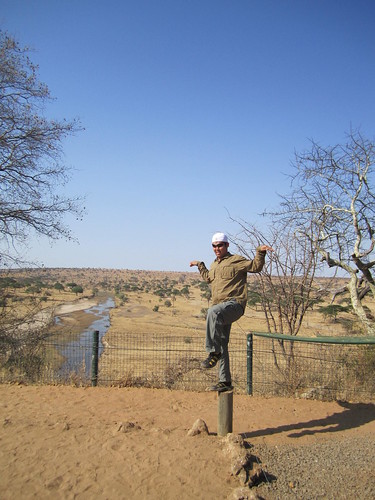
My karate kid "crane kick" impression.
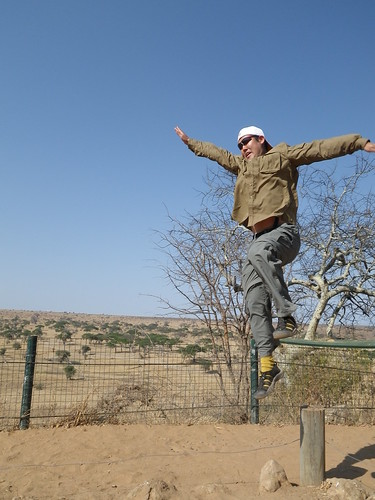
Best picture of my doing martial arts through the air. Does this remind anyone else of the tornado move of Chun-Li in Street Fighter?
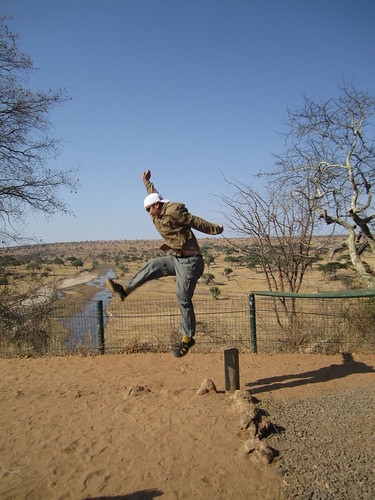
Worst picture of me doing martial arts. I suppose it could be a WWE or WCW stomp drop, but I'd be lying if I said that is what I had in mind.
Us crossing the mighty Tarangire as taken from the left side of the vehicle...
... and from the right. Woohoo!
Which brings me to my final safari topic: chochtkies!

Like any good tour operator, they wouldn't be doing their job if they didn't take us to one of the bazillion local dealers selling trinkets for which they (presumably) got some sort of kickback. David actually took us to two, and we didn't mind either of them. I actually got the above bookend for free, accidentally, as the place that (in a bit of poetic justice) drove us the hardest bargain mistakenly put it in our bag. There was this giraffe mask Resha wanted, and the guy wouldn't come down the last $2.
As far as I could tell, the entire Tanzanian souvenirs market consisted of three things. The first, and by far the least numerous, was Tanzanite.
(Photo courtesy of Cochise University)
Basically bluish/purpleish gems, they are only found in (and thus named after) Tanzania, and are specifically mined on the slopes of Mount Kilimanjaro. William bought a rectangular piece set in silver for his girlfriend. Like any good gem market, you could haggle, and luckily Resha had bought Tanzanite recently so as to assist William in his goal of not being taken to the cleaners. As expected, most of the markets only take cash, but the ones who sell Tanzanite do take credit cards.


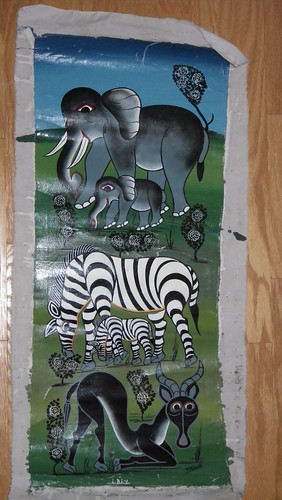

The next largest market is for these paintings of the African countryside, the Maasai, and animals. The ones above are about 8 inches by 20 inches, but they have all sorts of sizes. The opening price for these were $20 each, but I got them down to around $12. Of course, mounting them is a whole 'nother issue. We went to Michaels, and they said mounting one would cost about $150, even though I was named Michael. Ouch. William got a local frame store to do it for quite a bit cheaper, and they said that these were actually painted with house paint, as opposed to oil based paints, but I'm not mistaking these for Van Gogh's anyways.

By far the most numerous items, however, are these wood animal carvings. This giraffe stands about 10 inches tall. The opening price of the 16 year old kid with a backwards hat and sunglasses was $25 per animal, but I got him down to $12 without too much effort, and if you really cared, you can get them down to $10. For some reason, pretty much everyone we encountered typed out numbers on a calculator. I saw them being sold for about $15-$20 at the airport, so I knew I wasn't ripped off.


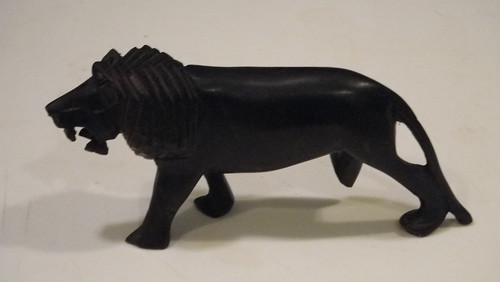

I tried to get the Big Five, but didn't find a leopard I really liked. These stand about three inches tall and are about six to eight inches long, and were also $12.

Sometimes the hippo is included as part of the Big Six.

Which brings us to the wildebeest. So, for some reason, I had a really hard time finding a wildebeest at the two markets David took us to. I looked around for probably a solid two hours total, but couldn't find one. Or at least one that wasn't made out of some crazy expensive wood, and thus triple the cost.
So, like I said, on the last day before our afternoon flight (and while William was having his ear talked off by Erica), Resha and I took a cab into town to look around and get some street food. Pretty much the only thing touristy of note in Arusha is the craft market, so the cabbie took us there with instructions to come back in precisely two hours. I guess it was a slow day there, because pretty much as soon as we entered the market, we were accosted by numerous sellers pushing their wares. However, Resha and I had a game plan where we were just looking for coffee for her (Kilimanjaro is known for its coffee) and a wildebeest for me, so we dutifully went around looking for just those things.
There were about four or five rows of twenty stalls each, and the first two rows were completely unfruitful. Finally, someone said they knew someone with coffee, and so we were led to another stall, which confused us a bit, since we thought the stalls were in competition, but maybe they had some sort of referral system in place? Anyways, we get to that stall and they have one box of about a pound of what looks like really old and stale coffee. "How much?" we ask. $20 they say. At this point, our Asian haggling radars go off, and we feel like we are being taken for a ride, so we pow-wow for a second and decide "you know what? There has to be a convenience store of some sort somewhere," so we decide to leave the market in search of this store. As we get a block away from the market and head toward the center of the "tourist" district part of town with nicer buildings that David showed us, we are definitely getting looks.
Anyways, we wander around for a bit, when we spot a food truck selling shwarma. Success in finding street food, we think. Unfortunately, we have come too early, and they don't have anything ready. We then duck into what looks like an internet cafe and find an Indian dude (a lot of the businesses here are run by Indians) selling samosas and pastries. We buy these and hungrily scarf these down. We had actually met an Asian girl in Ethiopia from San Francisco (and currently living in DC) who had been in Tanzania with the Peace Corps., and she had recommended a good pay-by-the-pound meat place, but we forgot to bring the address with us. She was on her way to Kenya to see her boyfriend. Her advice? "Don't eat the fish in Arusha." Duly noted.
As we wander some more and are about to give up, we finally do come upon a convenience store. It is run by a nice middle-aged woman who apparently is cashier, stockboy, and custodian all-in-one. The store is clean but not tidy, with unopened boxes everywhere and paperwork all over the front counter. We ask if she sells coffee, and indeed she does. $4 a pound. Bingo.

That's more like it. Resha buys 6 pounds, and I buy 2. We ask if she takes American money, and she says yes, but she doesn't know the exchange rate, and so asks another customer (she needs the exchange rate because she has to give us change in shillings). He says it's around 1400 shillings per dollar, which is pretty much the official rate of 1500, so we don't argue. I pay her in $20 bills, but again, she is not familiar with American money, so she asks the guy whether the currency is good. They have this thing here where they don't like taking old and ragged bills, so make sure any American dollars you take to Tanzania are relatively new (no more than 4 years old) and crisp.
Happy with our purchase, we go back to the crafts market to both wait for the taxi, and also to take one final stab at finding my wildebeest. As we get to the last of the stalls, we meet a guy who says he can find it, and makes me promise that I will stay right there for two minutes while he goes to get them, and then disappears. We wait for five minutes, but the time the cab is arriving is fast approaching, so we decide to leave. On the way out, I finally meet a thin man with gold teeth who has a wildebeest. It's actually quite a bit bigger than the other animals. Our conversation then goes like this:
Me: How much? You take dollars right?
Him: How much? You ask me how much? I have never been asked how much. People always tell me what they will pay.
Me: Well, okay. But how much?
Him: (Laughing) Okay, how about $20?
Me: $10.
Him: Haha, you see? I made a mistake by giving you a price first.
Me: Alright, $15.
Him: $16.
Me: $15.
Him: It's just one dollar.
Me: Right, it's just one dollar.
Him: Okay, okay, $15.
Me: Here is a $20.
Him: Is it okay if I give you change in shillings?
Me: Sure.
Him: Okay. (He hands the bill to a lady in the stall across the way, who runs off.)
... various pleasantries are exchanged...
Him: Okay, here you are. 5,000 shillings.
Me: That's not the exchange rate.
Him: I am just a poor shopkeeper. I don't know such things like the exchange rate. (He says all this smiling the whole time).
Me: Well, it's 1,500 shillings per dollar.
Him: What are these words? Fif-te-en hund-wad?
Me: Oh, come on, don't do this.
Him: Do what?
Me: One dollar. Elfu (1,000) tano (5) mia (100).
Him: (Has a puzzled and mildly shocked/amused look on his face that I know Swahili numbers).
Me: (I repeat) Elfu (1,000) tano (5) mia (100).
Him: (A smile comes across is face).
Me: Okay. Elfu (1,000). Just give me elfu shillings.
Him: Okay, okay. Wait a second. (Says something to the previous woman, who disappears again. She returns shortly thereafter with 1,000 shillings. We conclude our business and walk off).
As we walk off, the guy who had told me to wait before shows up with a bag full of wildebeests (how did I miss that many walking around?) and asks why I did not wait? I said it had been twenty minutes at this point, when he said he would be gone for like two. At this point, our taxi is definitely here, so we walk off, but not before I hear him (and others who were apparently sympathetic to him) saying things at me, of which the only one I could make out was Rafiki, which, of course, means monkey. I note the irony, inwardly chuckle, and step into the cab.
So, that's it for the safari. Next stop, Kili!

No comments:
Post a Comment